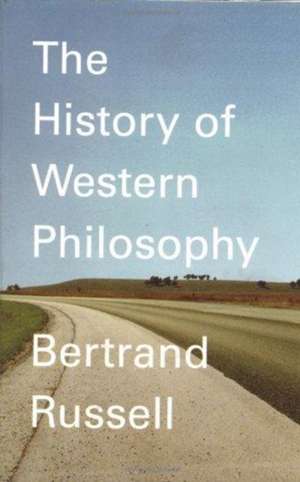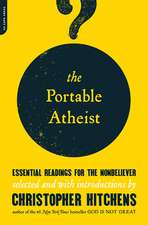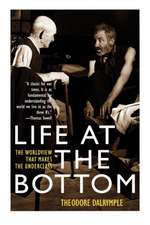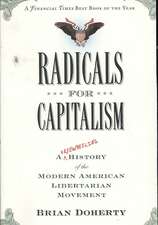A History of Western Philosophy: A Touchstone book
Autor Bertrand Russellen Limba Engleză Paperback – 30 sep 1967
Considered to be one of the most important philosophical works of all time, the "History of Western Philosophy" is a dazzlingly unique exploration of the ideologies of significant philosophers throughout the ages from Plato and Aristotle through to Spinoza, Kant and the twentieth century. Written by a man who changed the history of philosophy himself, this is an account that has never been rivaled since its first publication over sixty years ago.
Since its first publication in 1945, Lord Russell s "A History of Western Philosophy" is still unparalleled in its comprehensiveness, its clarity, its erudition, its grace, and its wit. In seventy-six chapters he traces philosophy from the rise of Greek civilization to the emergence of logical analysis in the twentieth century.
Among the philosophers considered are: Pythagoras, Heraclitus, Parmenides, Empedocles, Anaxagoras, the Atomists, Protagoras, Socrates, Plato, Aristotle, the Cynics, the Sceptics, the Epicureans, the Stoics, Plotinus, Ambrose, Jerome, Augustine, Benedict, Gregory the Great, John the Scot, Aquinas, Duns Scotus, William of Occam, Machiavelli, Erasmus, More, Bacon, Hobbes, Descartes, Spinoza, Leibniz, Locke, Berkeley, Hume, Rousseau, Kant, Hegel, Schopenhauer, Nietzsche, the Utilitarians, Marx, Bergson, James, Dewey, and lastly the philosophers with whom Lord Russell himself is most closely associated Cantor, Frege, and Whitehead, coauthor with Russell of the monumental "Principia Mathematica.""
Preț: 184.77 lei
Nou
Puncte Express: 277
Preț estimativ în valută:
35.35€ • 36.91$ • 29.26£
35.35€ • 36.91$ • 29.26£
Carte disponibilă
Livrare economică 14-28 martie
Livrare express 28 februarie-06 martie pentru 73.23 lei
Preluare comenzi: 021 569.72.76
Specificații
ISBN-13: 9780671201586
ISBN-10: 0671201581
Pagini: 895
Dimensiuni: 136 x 210 x 39 mm
Greutate: 0.68 kg
Editura: Touchstone Books
Seria A Touchstone book
ISBN-10: 0671201581
Pagini: 895
Dimensiuni: 136 x 210 x 39 mm
Greutate: 0.68 kg
Editura: Touchstone Books
Seria A Touchstone book
Notă biografică
Bertrand Arthur William Russell, 3rd Earl Russell, Viscount Amberley, born in Wales, May 18, 1872. Educated at home and at Trinity College, Cambridge. During World War I, served four months in prison as a pacifist, where he wrote Introduction to Mathematical Philosophy. In 1910, published first volume of Principia Mathematica with Alfred Whitehead. Visited Russia and lectured on philosophy at the University of Peking in 1920. Returned to England and, with his wife, ran a progressive school for young children in Sussex from 1927-1932. Came to the United States, where he taught philosophy successively at the University of Chicago, University of California at Los Angeles, Harvard, and City College of New York. Awarded the Nobel Prize for Literature in 1950. Has been active in disarmament and anti-nuclear-testing movements while continuing to add to his large number of published books which include Philosophical Essays (1910); The ABC of Relativity (1925) Human Knowledge: Its Scope and Limits (1948); Why I Am Not a Christian (1957); and The Autobiography of Bertrand Russell (1967). For a chronological list of Russell's principal works see The Basic Writings of Bertrand Russell (Simon and Schuster).
Cuprins
Table of Contents
Preface by Author
Introduction
BOOK ONE. ANCIENT PHILOSOPHY
Part I. The Pre-Socratics
Chapter I. The Rise of Greek Civilization
Chapter II. The Milesian School
Chapter III. Pythagoras
Chapter IV. Heraclitus
Chapter V. Parmenides
Chapter VI. Empedocles
Chapter VII. Athens in Relation to Culture
Chapter VIII. Anaxagoras
Chapter IX. The Atomists
Chapter X. Protagoras
Part II. Socrates, Plato, and Aristotle
Chapter XI. Socrates
Chapter XII. The Influence of Sparta
Chapter XIII. The Sources of Plato's Opinions
Chapter XIV. Plato's Utopia
Chapter XV. The Theory of Ideas
Chapter XVI. Plato's Theory of Immortality
Chapter XVII. Plato's Cosmogony
Chapter XVIII. Knowledge and Perception in Plato
Chapter XIX. Aristotle's Metaphysics
Chapter XX. Aristotle's Ethics
Chapter XXI. Aristotle's Politics
Chapter XXII. Aristotle's Logic
Chapter XXIII. Aristotle's Physics
Chapter XXIV. Early Greek Mathematics and Astronomy
Part III. Ancient Philosophy after Aristotle
Chapter XXV. The Hellenistic World
Chapter XXVI. Cynics and Sceptics
Chapter XXVII. The Epicureans
Chapter XXVIII. Stoicism
Chapter XXIX. The Roman Empire in Relation to Culture
Chapter XXX. Plotinus
BOOK TWO. CATHOLIC PHILOSOPHY
Introduction
Part I. The Fathers
Chapter I. The Religious Development of the Jews
Chapter II. Christianity During the First Four Centuries
Chapter III. Three Doctors of the Church
Chapter IV. Saint Augustine's Philosophy and Theology
Chapter V. The Fifth and Sixth Centuries
Chapter VI. Saint Benedict and Gregory the Great
Part II. The Schoolmen
Chapter VII. The Papacy in the Dark Ages
Chapter VIII. John the Scot
Chapter IX. Ecclesiastical Reform in the Eleventh Century
Chapter X. Mohammedan Culture and Philosophy
Chapter XI. The Twelfth Century
Chapter XII. The Thirteenth Century
Chapter XIII. Saint Thomas Aquinas
Chapter XIV. Franciscan Schoolmen
Chapter XV. The Eclipse of the Papacy
BOOK THREE. MODERN PHILOSOPHY
Part I. From the Renaissance to Hume
Chapter I. General Characteristics
Chapter II. The Italian Renaissance
Chapter III. Machiavelli
Chapter IV. Erasmus and More
Chapter V. The Reformation and Counter-Reformation
Chapter VI. The Rise of Science
Chapter VII. Francis Bacon
Chapter VIII. Hobbes's Leviathan
Chapter IX. Descartes
Chapter X. Spinoza
Chapter XI. Leibniz
Chapter XII. Philosophical Liberalism
Chapter XIII. Locke's Theory of Knowledge
Chapter XIV. Locke's Political Philosophy
Chapter XV. Locke's Influence
Chapter XVI. Berkeley
Chapter XVII. Hume
Part II. From Rousseau to the Present Day
Chapter XVIII. The Romantic Movement
Chapter XIX. Rousseau
Chapter XX. Kant
Chapter XXI. Currents of Thought in the Nineteenth Century
Chapter XXII. Hegel
Chapter XXIII. Byron
Chapter XXIV. Schopenhauer
Chapter XXV. Nietzsche
Chapter XXVI. The Utilitarians
Chapter XXVII. Karl Marx
Chapter XXVIII. Bergson
Chapter XXIX. William James
Chapter XXX. John Dewey
Chapter XXXI. The Philosophy of Logical Analysis
Index



















